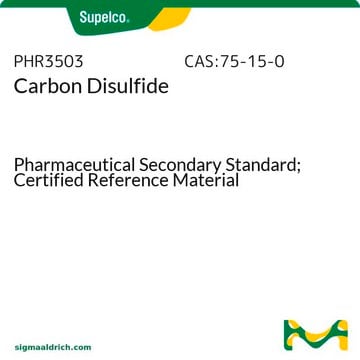About This Item
Recommended Products
form
liquid
concentration
5 M in THF
density
0.994 g/mL at 25 °C
SMILES string
S=C=S
InChI
1S/CS2/c2-1-3
InChI key
QGJOPFRUJISHPQ-UHFFFAOYSA-N
Looking for similar products? Visit Product Comparison Guide
related product
Signal Word
Danger
Hazard Statements
Precautionary Statements
Hazard Classifications
Carc. 2 - Eye Irrit. 2 - Flam. Liq. 2 - Repr. 2 - Skin Irrit. 2 - STOT RE 1 - STOT SE 3
Target Organs
Peripheral nervous system,Central nervous system,Cardio-vascular system,Eyes, Respiratory system
Supplementary Hazards
Storage Class Code
3 - Flammable liquids
WGK
WGK 2
Flash Point(F)
-22.0 °F
Flash Point(C)
-30 °C
Certificates of Analysis (COA)
Search for Certificates of Analysis (COA) by entering the products Lot/Batch Number. Lot and Batch Numbers can be found on a product’s label following the words ‘Lot’ or ‘Batch’.
Already Own This Product?
Find documentation for the products that you have recently purchased in the Document Library.
Our team of scientists has experience in all areas of research including Life Science, Material Science, Chemical Synthesis, Chromatography, Analytical and many others.
Contact Technical Service








